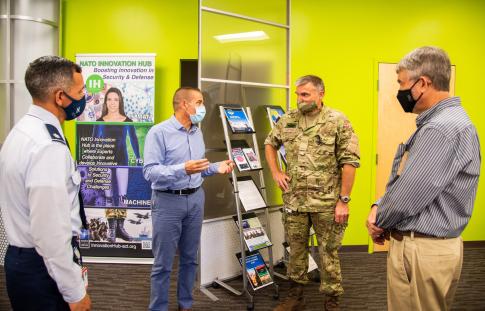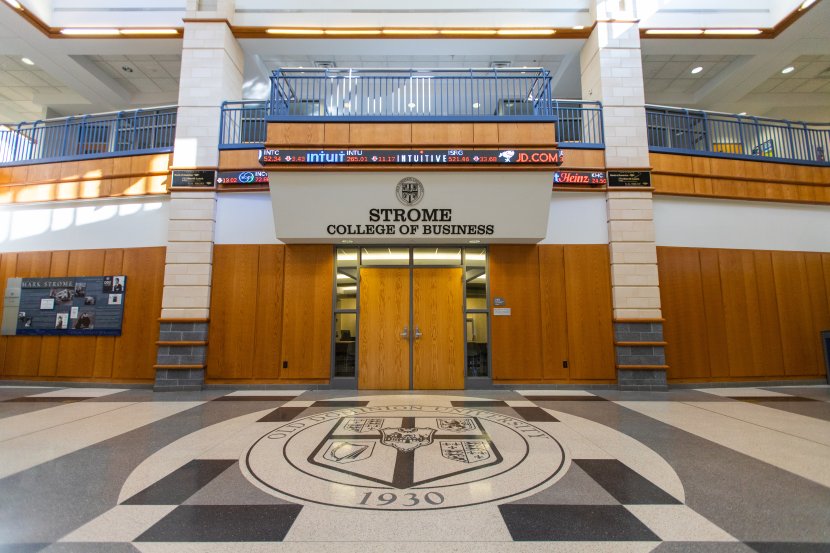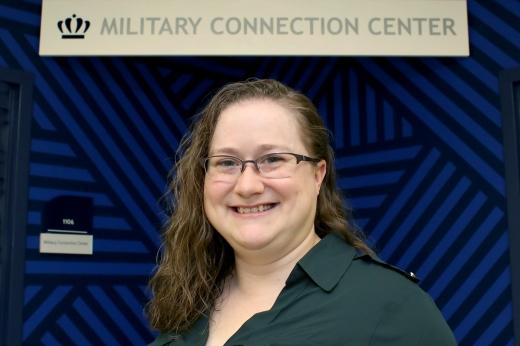From left, Lt. Col. Alfred Rosales and François du Cluzel (both of the NATO Innovation Hub), Brig. Gen. Poul Primdahl and Jerry Cronin, an executive director at ODU's Institute for Innovation and Entrepreneurship, chat during the wargame exercise.
The North Atlantic Treaty Organization's (NATO) Innovation Hub hosted its first fully online war game on Oct. 7 at its facility on the campus of Old Dominion University. The event was organized with ODU's Institute of Innovation and Entrepreneurship (IIE), which has been a key partner of the NATO Hub in creating and managing innovation.
The disruptive technology experiment (DTEX) is a new style of war game designed to quickly test ideas and technologies that can solve problems for NATO. This DTEX explored 46 technological solutions identified during the NATO Innovation Challenge held this spring. That challenge and this DTEX targeted solutions for identifying and countering the rising number of COVID19-related disinformation campaigns.
"This online DTEX is an excellent format to test innovative solutions and reflects the great collaboration between ODU and the NATO Innovation Hub," said Serge Da Deppo, founder of the NATO Innovation Hub. "DTEX is one of the many tools the Hub has implemented to test the feasibility and viability of ideas and solutions.
"The NATO Innovation Hub covers the full spectrum of innovation, from the Innovation Challenge to this DTEX, to delivering products to our NATO end-users. War games are part of this continuous innovation cycle. As a matter of fact, we have just launched our new innovation Challenge on autonomous systems in partnership with Italy. This really illustrates that Innovation is a never-ending process and is essential to keep NATO up to speed to adapt to fast-evolving threats."
ODU's IIE has worked with the NATO Innovation Hub over the past four years as it grew its mission of leveraging innovation to support the needs of the alliance, said Jerry Cronin, an executive director at ODU IIE who also observed the event.
"DTEX adds a valuable tool to the process of identifying issues, finding innovative solutions, then evaluating and implementing them," he said. "It is a logical extension of the NATO Innovation Challenges that we have partnered with the Hub on since 2017. It is exciting to see the collaboration grow and we are looking forward to continuing to help NATO achieve its mission by harnessing innovation."
Students from ODU's Graduate Program in International Studies (GPIS) and the new interdisciplinary cybersecurity program participated in this wargame as both facilitators and participants.
"We saw an opportunity to test the dozens of ideas we got through the recent open innovation challenge we had partnered with NATO on," said Girish Nandakumar, a graduate assistant with IIE and the chief architect of the DTEX war game. "We redesigned an existing NATO tabletop war game with the primary goal of hosting it fully online and within a workday. This enabled us to have participants from multiple universities across the U.S. and Europe."
Students from Virginia Wesleyan University, Johns Hopkins University, Czech Technical University, Charles University (Czech Republic) and the Defense and Security Innovation Hub (Czech Republic) also participated.
Robert Clark, ODU's director of military activities and special projects, attended the event on behalf of President John R. Broderick.
"The successful execution of the DTEX war game is another example of the strong and longstanding partnership between ODU and NATO," Clark said. "The existence of the NATO Innovation Hub at ODU further enhances our relationship and our collaborative efforts to solve the complex problems currently facing NATO and the U.S. military."
Related News Stories
ODU’s Graduate Program in International Studies Partners with Navy on New Initiative
The masters-level strategic leadership concentration combines leadership skills and a civilian perspective. (More)
Strome College of Business and Institute for Innovation & Entrepreneurship (IIE) Receive $400,000 Grant from the Ewing Marion Kauffman Foundation
The award recognizes ODU's efforts to support entrepreneurship among diverse communities in transition. (More)
G.I. Jobs magazine recognizes two ODU student veterans
Krista Brant and Katherine Martinez were among 48 selected nationwide for the award. (More)







